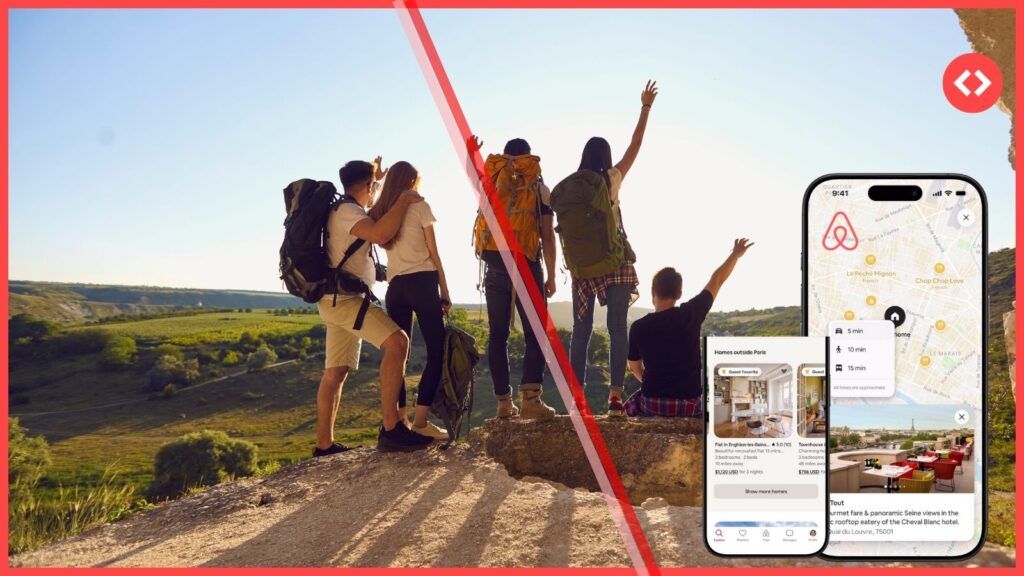While most tech companies are using AI to make decisions faster and workflows leaner, Airbnb is using it to make digital travel feel more human. Its latest product updates, Connections, Improved Maps, and Flexible Carousels, point to a clear doubling down on the original brand promise. The company is using AI not just to process data, but to rebuild something that has always been central to its identity: belonging.
1. A Return to Human-Centered Design
Airbnb’s original premise, letting strangers open their homes to each other, was a social experiment built on trust. Its founding ethos, belong anywhere, positioned hospitality as something emotional rather than transactional.
Over the years, scale and safety regulations turned Airbnb into a more standardized travel platform. But the brand never lost sight of the idea that its true product isn’t accommodation, it’s connection. That belief is now being reintroduced into the product itself.
With Connections, guests can see who else is joining the same Airbnb Experience and stay in touch afterward. Improved Maps help users explore the cultural and social texture of a neighborhood, not just its listings. Flexible Carousels expand discovery by suggesting homes just outside the user’s original criteria, making browsing feel serendipitous again.
Together, these features suggest Airbnb wants to bring curiosity and connection back into the travel process, and use AI to do it at scale.
2. More Than Sentimentality, It’s Strategy
This renewed focus on “human connection” isn’t just a return to the brand’s roots. It’s a strategic response to how the travel market is changing.
Other major platforms, from Booking.com to Expedia, have built their edge on optimization: better prices, faster search results, more inventory. That model is hard to sustain when everyone has access to the same AI capabilities. Airbnb’s move, instead, is toward emotional differentiation, towards building a travel ecosystem that satisfies not just practical needs, but psychological ones.
If you were to plot this shift on Maslow’s hierarchy of needs, most online travel agencies still operate at the base levels: safety, comfort, convenience. Airbnb, however, is moving toward the top: belonging, esteem, and self-actualization. It’s reframing travel not as a service, but as a means of human fulfillment.
That’s not sentimental idealism. It’s a competitive moat. Emotional loyalty is much harder to replicate than discounts or points.
3. Chesky’s Vision: AI That Understands, Not Just Automates
Brian Chesky’s remarks over the past year make it clear that he doesn’t see AI as a back-end optimization tool. He sees it as a creative interface, something that can help people feel known and understood.
In an interview on Masters of Scale, Chesky said he finds it strange that:
“I open all these apps, and none of them know me.”
He’s working with former Apple designer Jony Ive to rethink how AI interfaces could work, not as chatbots that spit out answers, but as intelligent companions that learn from the user’s context, habits, and aspirations. The goal is to make the app feel like a concierge, not a command line.
“You open an app, and it should learn about you — who you are, what you care about, what you want to do before you die,” Chesky said.
This kind of personalization goes beyond product recommendations. It imagines a travel experience that understands why someone travels, for connection, escape, growth, and shapes itself accordingly.
4. Building “Emotional Infrastructure” Through Product
Airbnb’s recent updates function like layers in what might be called emotional infrastructure, technology designed to evoke curiosity, connection, and community.
- Connections restore the human layer between guests.
- Maps provide social context, helping travelers navigate not just geography, but culture.
- Carousels reintroduce spontaneity, broadening the traveler’s sense of possibility.
Each of these features maps to higher-level human needs, reinforcing Airbnb’s psychological positioning in the travel space. It’s the software equivalent of building a product around empathy.
From a business standpoint, these design choices also produce richer behavioral data: who travels together, what experiences cluster by theme or location, and how discovery patterns evolve. That data gives Airbnb new ways to personalize both listings and experiences, deepening engagement without relying on traditional loyalty programs.
5. Emotional Loyalty as a Business Model
Unlike competitors who drive repeat bookings through discounts and rewards, Airbnb is cultivating what could be called relationship-based retention.
If guests return because of who they met, how they felt, or the memories they formed, that’s a different kind of stickiness, rooted in sentiment rather than transaction.
For hosts and property managers, this direction has practical implications:
- Listings tied to authentic experiences or local partnerships may see higher visibility.
- Multi-property managers could benefit from repeat groups; travelers reconnecting in different cities.
- Local storytelling, once a branding exercise, could become an operational advantage.
Airbnb’s evolution suggests that future success won’t come from managing more listings, but from managing more meaningful ones.
6. The Bigger Picture: Using AI to Humanize Scale
Chesky has been vocal about AI’s promise and its limits. He’s optimistic about its potential for creativity but skeptical of how it’s currently used. He’s called the current generation of AI “overrated” not because it lacks intelligence, but because it lacks empathy. It can parse language but not emotion, and it can predict behavior but not intention.
That’s the gap Airbnb is trying to close. Its bet is that the next frontier of AI isn’t cognitive, it’s emotional. In a world of machine learning, the company is leaning into meaning-making.
If successful, this won’t just make Airbnb more engaging; it could redefine what “smart travel” means. Not travel that simply reacts to you, but travel that understands you.
7. The Takeaway
Airbnb isn’t building an AI-driven travel product in the same way others are. It’s building a human-driven AI product, one that uses data to surface emotion rather than suppress it.
Under Chesky’s leadership, the company is betting that the next phase of digital travel will be less about efficiency and more about empathy.
And if that sounds idealistic, remember: Airbnb has built a multi-billion-dollar business on the idea that strangers can trust each other. Betting on human connection has worked before.
This time, the algorithm’s learning to do it too.
Uvika Wahi is the Editor at RSU by PriceLabs, where she leads news coverage and analysis for professional short-term rental managers. She writes on Airbnb, Booking.com, Vrbo, regulations, and industry trends, helping managers make informed business decisions. Uvika also presents at global industry events such as SCALE, VITUR, and Direct Booking Success Summit.








